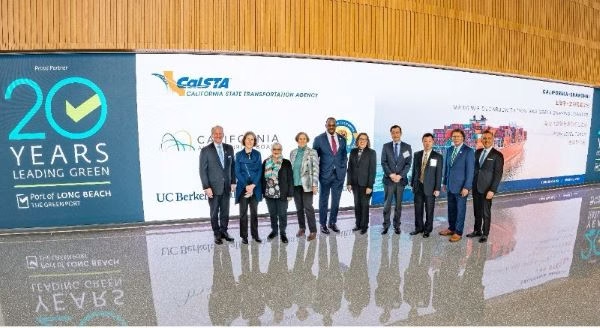LOS ANGELES —Transportation and environmental policy leaders and scholars from California state agencies and the ports of Long Beach, Los Angeles and Shanghai
gathered March 17, hosted by the Port of Long Beach, to discuss their efforts to decarbonize the maritime industry via development of a Green Shipping Corridor between California and Shanghai.
This event highlighted the role of infrastructure development and the policies and regulations needed to advance international green shipping corridors.
Through the years, California and China have engaged in open dialogue on climate cooperation. In 2023, Gov. Gavin Newsom traveled to China where he committed to collaboration to advance shared interests related to climate action, the reduction of greenhouse gas emissions and short-lived climate pollutants and the acceleration and deployment of clean energy. During the visit, five cooperative agreements were signed. One Memorandum of Understanding between California and Shanghai aims to advance clean, low-carbon transportation including the development of clean ports and green shipping. This work complements the existing partnership between the ports of Los Angeles, Long Beach and Shanghai to decarbonize one of the world’s busiest container shipping routes.
The forum was an opportunity to highlight that the Port of Long Beach, together with the Port of Los Angeles, C40 Cities and the Shanghai Municipal Transportation Commission or SMTC, jointly published, in October 2024, their first ever Green Shipping Corridor Partnership Annual Progress Report, which outlines significant progress made toward decarbonizing maritime vessels. The Port of Long Beach also recently published a white paper on the use of clean marine fuels in shipping.
Green Shipping Corridors provide a forum for partnership and cooperation where all participating parties come together with an aim to achieve goals and advance toward use of low- and zero-carbon fuels and technologies.
One of these corridors is the Los Angeles – Long Beach – Shanghai Green Shipping Corridor. Goals in this specific green corridor include deploying reduced or zero lifecycle carbon emission capable ships and facilitating investment in clean marine fueling infrastructure at the partner ports.
This forum brought together leadership to weigh in on these topics, to dive deeper into the necessary components of green shipping corridors and explore opportunities for greater collaboration in this emerging space.
In 2024, California State leadership traveled to Shanghai to see port operations in real time and witness firsthand innovation being employed. Later that same year, the United States Department of Energy published a Maritime Decarbonization Action Plan, which identified pathways to achieve a zero-emissions maritime sector by 2050.
“California is a global leader in climate action and is committed to the health and prosperity of both people and planet,” said CARB Chair Liane Randolph. “As a champion for clean air, the California Air Resources Board remains dedicated to working together to identify opportunities for deeper decarbonization in the green shipping space.”
CCCI, a University of California-wide initiative housed jointly at UC Berkeley’s Rausser College of Natural Resources and School of Law, supported much of the planning for the forum. Through research, training and dialogue, CCCI aims to inform policymakers, foster cooperation and partnership, and drive climate solutions at all levels.
“In this interconnected world, where we share oceans, shipping corridors, trade and climate impacts, it’s increasingly critical for us to also share ideas and solutions,” said CCCI Executive Director Fan Dai. “Cutting climate pollution from shipping requires deep collaboration, and that’s what this forum is all about.”



